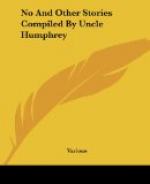This incident roused Thomas Howland to a distinct consciousness of the danger that lurked in his path, as a young man, in a large city. He felt, as he had not felt while simply listening to his father’s precept, the value of the word no; and resolved that hereafter he would utter that little word, and that, too, decidedly, whenever urged to do what his judgment did not approve.
“I will be free!” he said, pacing his chamber backward and forward. “I will be free, hereafter! No one shall persuade me or drive me to do what I feel to be wrong.”
That conclusion was his safeguard ever after. When tempted, and he was tempted frequently, his “No” decided the matter at once. There was a power in it that was all-sufficient in resisting evil.
WILLY AND THE BEGGAR GIRL.
“An apple, dear mother!”
Cried Willy one day,
Coming in, with his cheeks
Glowing bright, from his play.
“I want a nice apple,
A large one, and red.”
“For whom do you want it?”
His kind mother said.
“You know a big apple
I gave you at noon;
And now for another,
My boy, it’s too soon.”
“There’s a poor little girl
At the door, mother dear,”
Said Will, while within
His mild eye shone a tear.
“She says, since last evening
She’s eaten no bread;
Her feet are all naked
And bare is her head.
Like me, she’s no mother
To love her, I’m sure,
Or she’d not look so hungry,
And ragged, and poor.
“Let me give her an apple;
She wants one, I know;
A nice, large, red apple—
O! do not say no.”
First a kiss to the lips
Of her generous boy,
Mamma gave with a feeling
Of exquisite joy—
For goodness, whene’er
In a child it is seen,
Gives joy to the heart
Of a mother, I ween—
And then led her out, where,
Still stood by the door,
A poor little beggar-girl,
Ragged all o’er.
“Please ma’am, I am hungry,”
The little thing said,
“Will you give me to eat
A small piece of bread?”
“Yes, child, you shall have it;
But who sends you out
From dwelling to dwelling
To wander about?”
A pair of mild eyes
To the lady were raised;
“My mother’s been sick
For a great many days
So sick she don’t know me.”
Sobs stifled the rest
And heaved with young sorrow
That innocent breast.
Just then from the store-room—
Where wee Willy run,
As his mother to question
The poor child begun—
Came forth the sweet boy,
With a large loaf of bread,
Held tight in his tiny hands
High o’er his head.
“Here’s bread, and a plenty!
Eat, little girl, eat!”
He cried, as he laid
The great loaf at her feet.
The mother smiled gently,
Then, quick through the door
Drew the sad little stranger,
So hungry and poor.




